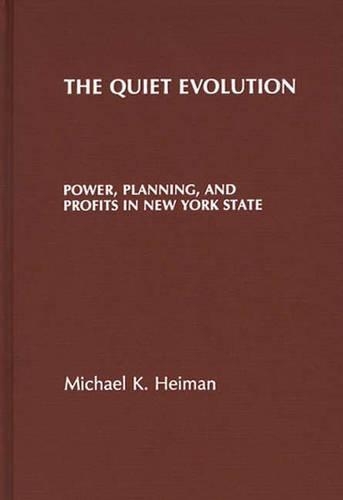
The Quiet Evolution: Power, Planning, and Profits in New York State
(Hardback)
Publishing Details
The Quiet Evolution: Power, Planning, and Profits in New York State
By (Author) Michael K. Heiman
Bloomsbury Publishing PLC
Praeger Publishers Inc
12th August 1988
United States
Classifications
Tertiary Education
Non Fiction
333.731309747
Physical Properties
Hardback
337
Description
The Quiet Evolution refers to the profusion of American planning reform literature and practices dealing with local land-use control. As such, this work will be of paramount interest to planning students and practitioners, urban sociologists, political scientists, and georgraphers. Contributing to a new and exciting resurgence of critical social theory that examines popular attention to environmental quality, defense of residential districts, and other consumption issues, The Quiet Evolution will prove useful to social theorists in the field of sociology, geography, political science, and history.
Reviews
"A valuable contribution to an emerging radical critique of liberal environmentalism. . . . [In] Keep Out: The Struggle for Land Use Control, Heiman opposes the reformist claim that lifting control of land use to regional or state levels can fairly accommodate competing demands for the use of land. For him, this belief overlooks contradictions between consumption and production, which are immune to evenhanded administrative control. With New York State as his laboratory, Heiman carefully shows how institutions such as the Regional Plan Association of New York, the Port Authority, and the Adirondack Park Agency reflect capitalist backing for private and public regional planning and create resistance movements among local consumer and producer interests. . . . [The] theoretical and empirical analysis here demand attention, and this book belongs in graduate collections in planning and environmental studies."-Choice
. . . It will prove useful to social theorists and students in geography, political science, history, and sociology.-Recent Publications on Governmetal Problems
A valuable contribution to an emerging radical critique of liberal environmentalism. . . . [In] Keep Out: The Struggle for Land Use Control, Heiman opposes the reformist claim that lifting control of land use to regional or state levels can fairly accommodate competing demands for the use of land. For him, this belief overlooks contradictions between consumption and production, which are immune to evenhanded administrative control. With New York State as his laboratory, Heiman carefully shows how institutions such as the Regional Plan Association of New York, the Port Authority, and the Adirondack Park Agency reflect capitalist backing for private and public regional planning and create resistance movements among local consumer and producer interests. . . . [The] theoretical and empirical analysis here demand attention, and this book belongs in graduate collections in planning and environmental studies.-Choice
Heiman's strength is placing land use struggles in a rigorous theoretical context that gives the reader a powerful understanding of the forces pushing toward centralization of land use control and of the rise of the social movements opposed to its centralization. Heiman's argument is...careful and complex and deserves serious consideration. Class analysis is nor common fare for planners, and too often it is reductionistic. But in Heiman's hands it becomes a subtle and sensitive tool for understanding land use politics and the rise of the new intra-class growth control movement.-APA Journal
." . . It will prove useful to social theorists and students in geography, political science, history, and sociology."-Recent Publications on Governmetal Problems
"Heiman's strength is placing land use struggles in a rigorous theoretical context that gives the reader a powerful understanding of the forces pushing toward centralization of land use control and of the rise of the social movements opposed to its centralization. Heiman's argument is...careful and complex and deserves serious consideration. Class analysis is nor common fare for planners, and too often it is reductionistic. But in Heiman's hands it becomes a subtle and sensitive tool for understanding land use politics and the rise of the new intra-class growth control movement."-APA Journal
Author Bio
MICHAEL K. HEIMAN is an Assistant Professor in the Department of Geography, Syracuse University.
